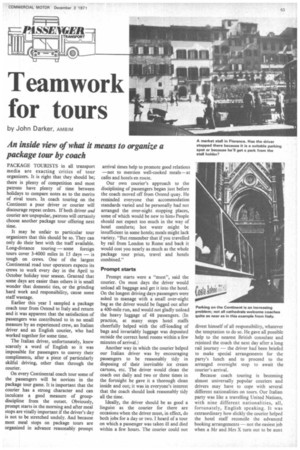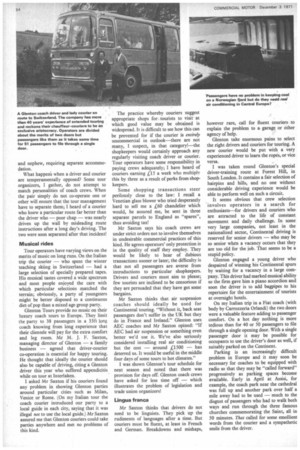Teamwork for tours
Page 55

Page 56

If you've noticed an error in this article please click here to report it so we can fix it.
by John Darker, AMBIM
An inside view of what it means to organize a package tour by coach
PACKAGE TOURISTS in all transport media are exacting critics of tour organizers. It is right that they should be; there is plenty of competition and most patrons have plenty of time between holidays to compare notes as to the merits of rival tours. In coach touring on the Continent a poor driver or courier will discourage repeat orders. If both driver and courier are unpopular, patrons will certainly choose another package tour offering next time.
It may be unfair to particular tour organizers that this should be so. They can only do their best with the staff available. Long-distance touring — some foreign tours cover 3-4000 miles in 15 days — is tough on crews. One of the largest Continental road tour operators expects its crews to work every day in the April to October holiday tour season. Granted that some days are easier than others it is small wonder that domestic ties, or the grinding hard work and responsibility, cause some staff wastage.
Earlier this year I sampled a package coach tour from Ostend to Italy and return and it was apparent that the satisfaction of passengers was contributed to in no small measure by an experienced crew, an Italian driver and an English courier, who had worked together for some time.
The Italian driver, unfortunately, knew scarcely a word of English so it was impossible for passengers to convey their compliments, after a piece of particularly skilful driving, other than through the courier.
On every Continental coach tour some of the passengers will be novices in the package tour game. It is important that the courier has a strong character and can inculcate a good measure of groupdiscipline from the outset. Obviously, prompt starts in the morning and after meal stops are vitally important if the driver's day is not to be stretched unduly. And because most meal stops on package tours are organized in advance reasonably prompt
arrival times help to promote good relations —not to mention well-cooked meals — at cafes and hotels en route.
Our own courier's approach to the disciplining of passengers began just before the coach moved off from Ostend quay. He reminded everyone that accommodation standards varied and he personally had not arranged the over-night stopping places, some of which would be new to him? People should not expect too much in the way of hotel comforts; hot water might be insufficient in some hotels; meals might lack variety. "But remember that if you travelled by rail from London to Rome and back it would cost you nearly as much as the whole package tour price, travel and hotels combined."
Prompt starts Prompt starts were a "must", said the couricr. On most days the driver would unload all baggage and get it into the hotel. On the longest driving days passengers were asked to manage with a small over-night bag as the driver would be fagged out after a 400-mile run, and would not gladly unload the heavy luggage of 48 passengers. (In practice, at many stops hotel staffs cheerfully helped with the off-loading of bags and invariably luggage was deposited outside the correct hotel rooms within a few minutes of arrival.) Another way in which the courier helped our Italian driver was by encouraging passengers to be reasonably tidy in disposing of their inevitable ice cream cartons, etc. The driver would clean the coach out daily and two or three times in the fortnight he gave it a thorough clean inside and out; it was in everyone's interest that the coach should look reasonably tidy all the time.
Ideally, the driver should be as good a linguist as the courier for there are occasions when the driver must, in effect, do both jobs for a day or two. I heard of a tour on which a passenger was taken ill and died within a few hours. The courier could not divest himself of all responsibility, whatever the temptation to do so. He gave all possible help to the nearest British consulate and rejoined the coach the next day after a long rail journey — the driver had been briefed to make special arrangements for the party's lunch and to proceed to the arranged overnight stop to await the courier's arrival.
Because coach touring is becoming almost universally popular couriers and drivers may have to cope with several different nationalities on tours. Our Italian party was like a travelling United Nations, with nine different nationalities, all, fortunately, English speaking. It was extraordinary how slickly the courier helped the hotel staff reconcile the advanced booking arrangements — not the easiest job when a Mr and Mrs X turn out to be aunt
and nephew, requiring separate accommodation.
What happen's when a driver and courier are temperamentally opposed? Some tour organizers, I gather, do not attempt to match personalities of coach crews. When the pair simply do not co-operate one or other will ensure that the tour management have to separate them; I heard of a courier who knew a particular route far better than the driver who — poor chap — was nearly driven up the wall by misleading route instructions after a long day's driving. The two were soon separated after that incident!
Musical rides Tour operators have varying views on the merits of music on long runs. On the Italian trip the courier — who spent the winter teaching skiing in Switzerland — had a large selection of specially prepared tapcs. His musical tastes covered a wide spectrum and most people enjoyed the care with which particular selections matched the terrain; obviously, a party of youngsters might be better disposed to a continuous diet of pop than a mixed age group party.
Glenton Tours provide no music on their luxury coach tours to Europe. They limit the party to 38 passengers in a 33ft lone coach knowing from long experience that their clientele will pay for the extra comfort and leg room. Mr M. J. R Saxton, managing director of Glenton — a family business — agreed that driver-courier co-operation is essential for happy touring. He thought that ideally the courier should also be capable of driving, citing a Glenton driver this year who suffered appendicitis while on tour at Interlaken.
I asked Mr Saxton if his couriers found any problem in showing Glenton parties around particular cities such as Milan, Venice or Rome. (On my Italian tour the coach courier introduced our party to a local guide in each city, saying that it was illegal not to use the local guide.) Mr Saxton assured me that Glenton couriers could take parties anywhere and met no problems of this kind. The practice whereby couriers suggest appropriate shops for tourists to visit at which good value may be obtained is widespread. It is difficult to see how this can be prevented for if the courier is entirely uncommercial in outlook—there are not many, I suspect, in that category!—the shopkeepers would certainly approach any regularly visiting coach driver or courier. Tour operators have some responsibility in paying crews adequately; I have heard of couriers earning £15 a week who multiply this by three as a result of perks from shopkeepers.
Some shopping transactions steer perilously close to the law: I recall a Venetian glass blower who tried desperately hard to sell me a £60 chandelier which would, he assured me, be sent in three separate parcels to England as "spares", thus avoiding tax!
Mr Saxton says his coach crews are under strict orders not to involve themselves in undesirable commercial practices of this kind. He agrees operators' only protection is in the quality of staff they employ. They would be likely to hear of dubious transactions sooner or later; the difficulty is that not all passengers are averse from introductions to particular shopkeepers. Drivers and couriers must aim to please; few tourists are inclined to be censorious if they are persuaded that they have got some bargains.
Mr Saxton thinks that air suspension coaches should ideally be used for Continental touring. "Without it, back seat passengers don't suffer in the UK but they do in France and Ireland." Glenton uses AEC coaches and Mr Saxton opined: "If AEC had air suspension or something even better we'd use it. We've also seriously considered installing real air conditioning but the cost — around £1500 — has deterred us. It would be useful in the middle four days of some tours to hot climates."
I was shown Glenton's tour schedule for next season and noted that there was provision for days off. Glenton coach crews have asked for less time off — which illustrates the problem of legislation and trade union organizers!
Lingua franca Mr Saxton thinks that drivers do not need to be linguists. They pick up the rudiments of languages after a time. But couriers must be fluent, at least in French and German. Breakdowns and mishaps, however rare, call for fluent couriers to explain the problem to a garage or other agency of help.
Glenton take enormous pains to select the right drivers and couriers for touring. A new courier would be put with a very experienced driver to learn the ropes, or vice versa.
I was taken round Glenton's special driver-training route at Forest Hill, in South London. It contains a fair selection of hairpins and hills, and no one without considerable driving experience would be able to perform well on such a circuit.
It seems obvious that crew selection involves operators in a search for enthusiasts—for drivers and couriers who are attracted to the life of constant movement and daily challenge. In some very large companies, not least in the nationalized sector, Continental driving is reserved for senior drivers — who may be so senior when a vacancy occurs that they are too old for the job. That seems to be a stupid policy.
Glenton engaged a young driver who despaired of winning his Continental spurs by waiting for a vacancy in a large company. This driver had marked musical ability so the firm gave him a piano accordion and soon the driver is to add bagpipes to his repertoire for the entertainment of tourists at overnight hotels.
On my Italian trip in a Fiat coach (with body by Carrozzeria Orlandi) the two doors were a valuable feature adding to passenger comfort. On a hot day nothing is more tedious than for 40 or 50 passengers to file through a single opening door. With a single passenger door it may be possible for occupants to use the driver's door as well, if suitably parked on the Continent.
Parking is an increasingly difficult problem in Europe and it may soon be necessary for coaches to be equipped with radio so that they may be "called forward" progressively as parking spaces become available. Early in April at Assisi, for example, the coach park near the cathedral was full up and another park over half a mile away had to be used — much to the disgust of passengers who had to walk both ways and run through the three famous churches commemorating the Saint, all in 50 minutes. That called for some emollient words from the courier and a sympathetic smile from the driver.


































































































































